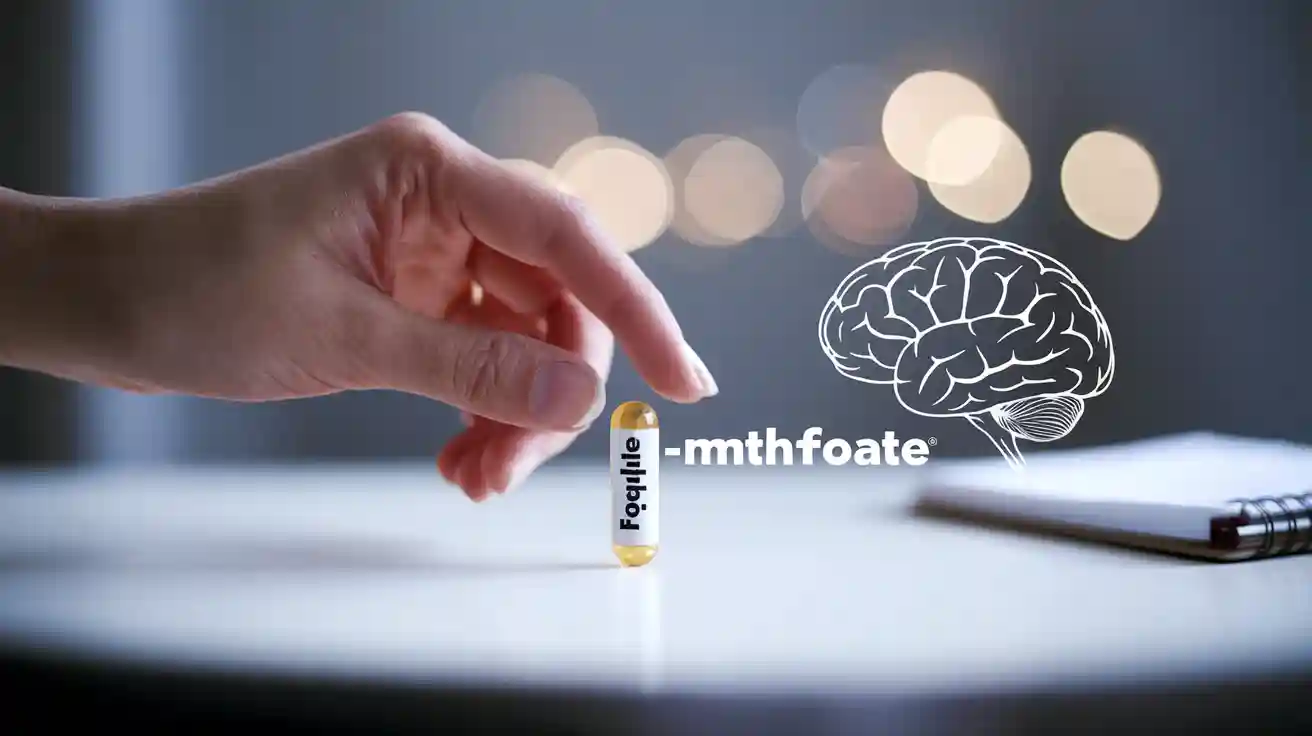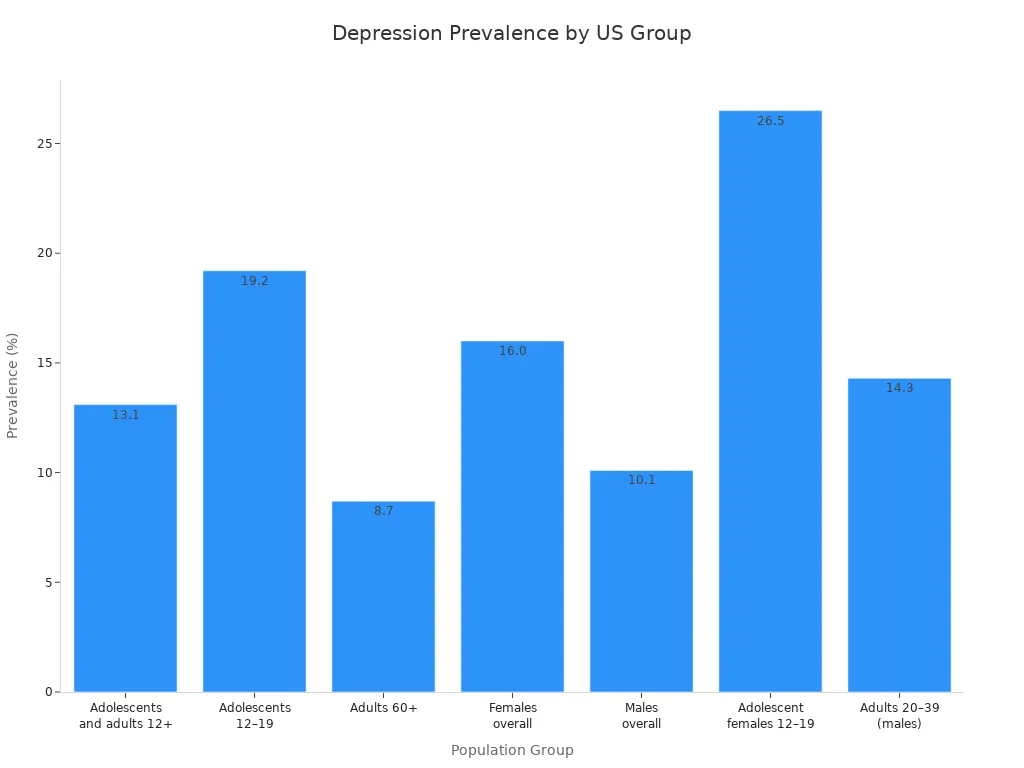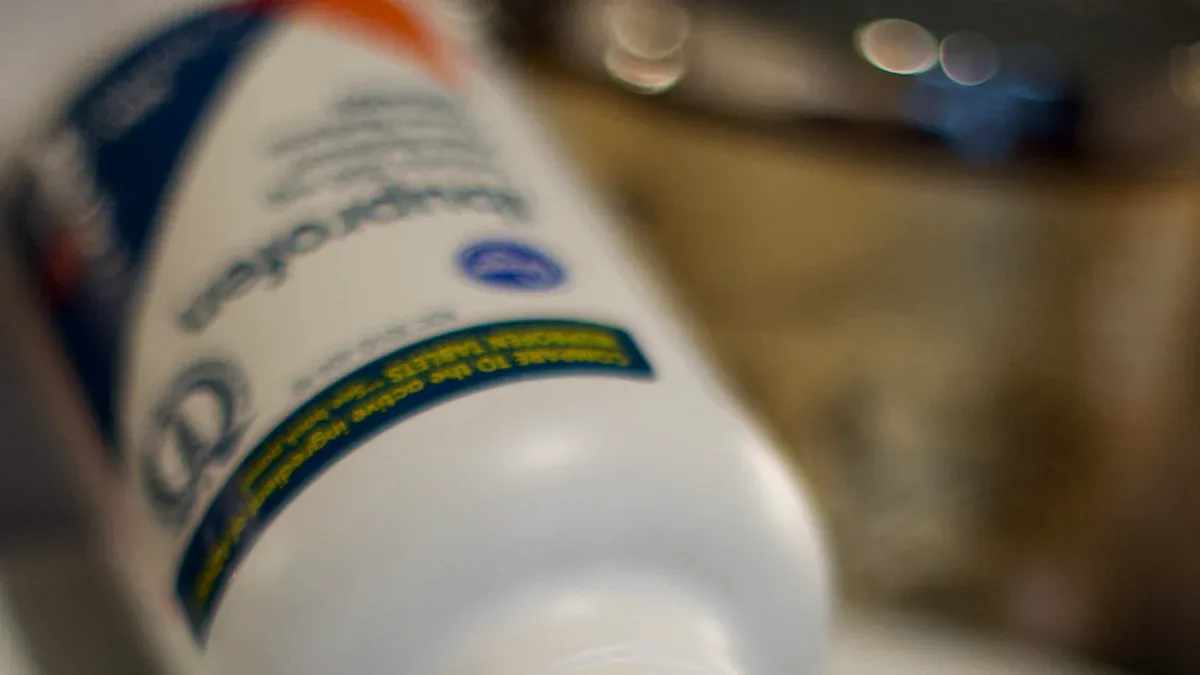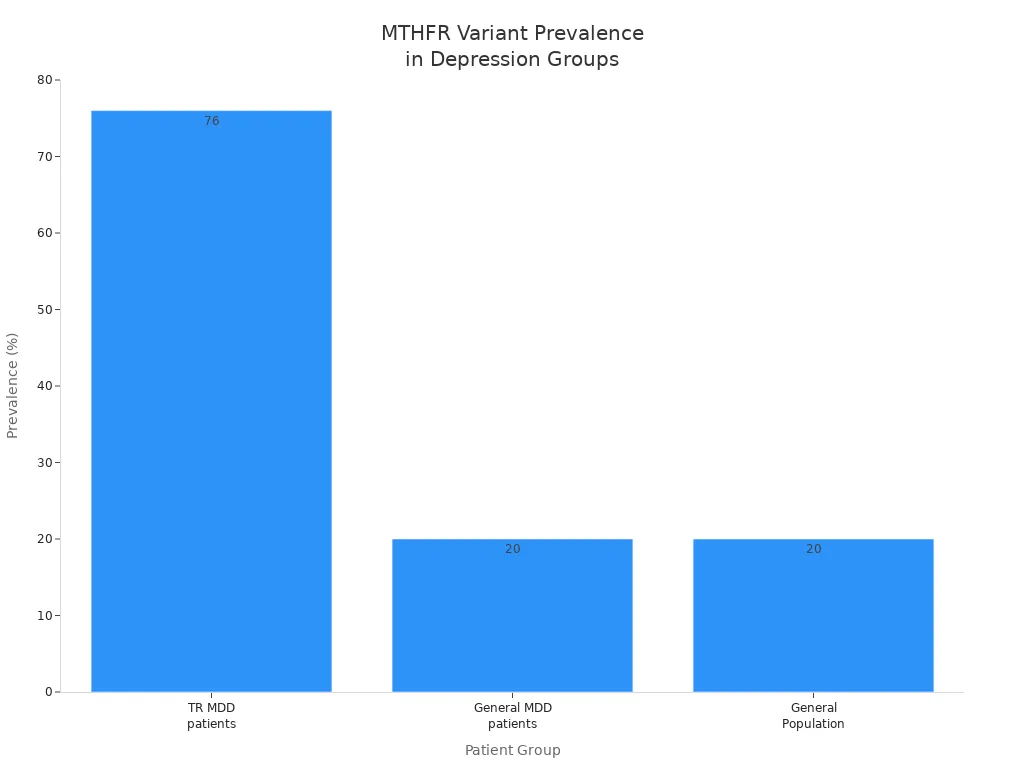L-Methylfolate Dosage for Depression Explained Simply
Table of Contents

If you want to know the recommended l-methylfolate dosage for depression, most doctors suggest starting with 15 mg per day. Many people in the United States struggle with depression. In 2020, about 18.4% of adults reported being diagnosed with it. You may notice that l-methylfolate is often used alongside other depression treatments.

This guide gives you clear advice about l-methylfolate dosage and safety. Always talk to your doctor before starting or changing any supplement. You can trust this information, which comes from clinical research and real-world experience. If you wonder where to purchase l-methylfolate, your doctor or pharmacist can help.

L-Methylfolate Dosage Overview
Recommended Dosage of L-Methylfolate
When you look for the most effective l-methylfolate dosage for depression, you will find that 15 mg daily is the amount most doctors recommend. This dose has been studied the most in clinical trials. You usually take l-methylfolate as an add-on to your antidepressant, especially if your depression does not improve with standard treatment. Doctors call this the adjunctive use of methylfolate. You may also see l-methylfolate used alone, but most research supports its use with other medications.
Note: The recommended dosage of l-methylfolate for depression is much higher than the amount of folate you need for general health. For example, adults need about 400 micrograms (mcg) of folate each day, but l-methylfolate for depression uses doses from 5,000 mcg (5 mg) up to 15,000 mcg (15 mg) daily.
Dosage Range
You may wonder if everyone starts at 15 mg. The answer is no. Doctors often begin with a lower dose and increase it slowly. The typical dosages of l-methylfolate for depression range from 7.5 mg to 15 mg once daily. Lower doses, such as 5 mg, are sometimes used for people with certain genetic differences or for sleep problems, but these are not the standard for treating depression.
- Most clinical trials use 15 mg per day as the target dose.
- Studies show that 7.5 mg per day is less effective for depression.
- The 15 mg daily dose leads to better improvement in mood and symptoms.
- L-methylfolate at 15 mg is well tolerated, with side effects similar to a placebo.
Here is a table showing the available prescription forms:
| Prescription Form | Dosage Strengths | Typical Dosage | Notes |
|---|---|---|---|
| Tablet | 7.5 mg | 7.5 – 15 mg once daily | Used for depression; dose individualized |
| Tablet | 15 mg | 7.5 – 15 mg once daily | Same as above |
| Special Considerations | N/A | Not to exceed 40 mg/day | For people with kidney or liver problems |
You may see l-methylfolate sold under the brand name Deplin. It comes in 7.5 mg and 15 mg tablets. Your doctor will choose the best dose for you.
Titration and Adjustments
Doctors do not always start you at the highest dose. They may begin with a lower l-methylfolate dosage, such as 5 mg or 7.5 mg, and increase it slowly. This process is called titration. You might increase your dose by 1-2 mg each week until you reach 15 mg daily. This slow increase helps reduce side effects like stomach upset, anxiety, or agitation.
- Your doctor will watch how you respond to the medication.
- If you have side effects, your doctor may adjust your dose.
- Some people need genetic testing, such as for MTHFR gene changes, to help guide the best dose.
- You should always follow your doctor’s instructions and never change your dose on your own.
Tip: If you take methylfolate with antidepressants, you may notice better results, especially if your depression has not improved with other treatments. The evidence for efficacy is strongest when you use l-methylfolate as an add-on therapy.
Clinical trials show that the 15 mg daily dose works best for most people. You should talk to your doctor about the right l-methylfolate dosage for your needs.
How to Take L-Methylfolate for Depression
Starting L-Methylfolate
You should begin l-methylfolate treatment with a simple titration plan. Most doctors recommend starting at 5mg daily for the first three weeks. After this period, you can increase your dose to 10 mg each day for another three weeks. If you tolerate l-methylfolate well, your doctor may raise your dose to 15 mg daily as a maintenance level. This step-by-step approach helps your body adjust to methylfolate and lowers the risk of side effects.
Tip: If you notice anxiety after starting l-methylfolate, let your doctor know. If anxiety lasts more than a week, you may need to stop the supplement.
Before you begin, your doctor will look at several factors. These include your body weight, any history of poor nutrition, and whether you use tobacco or alcohol. Your doctor may also check for genetic differences, like the MTHFR gene, which can affect how your body uses methylfolate. Some medicines, such as lamotrigine or metformin, can change how l-methylfolate works in your body.
Monitoring and Adjusting
As you take l-methylfolate, you need to watch for both benefits and side effects. Keep track of your mood and any changes in your depression symptoms. You may notice improvements in energy, sleep, or motivation. If you feel discomfort, nausea, or develop a rash, tell your doctor. Sometimes, lowering the dose or waiting a few days can help.
Doctors often combine l-methylfolate with antidepressants. This combination can lead to faster and greater improvement in depression. If you have obesity or high inflammation, your response to l-methylfolate may differ. Your doctor will adjust your dose based on how you feel and any side effects.
When to Consult Your Doctor
You should contact your doctor if you have any severe symptoms. These include thoughts that life is not worth living or using too much alcohol or drugs. Seek help right away if you have signs of an allergic reaction, such as hives, swelling, or trouble breathing.
Let your doctor know if you have epilepsy, vitamin B12 deficiency, or bipolar disorder before starting l-methylfolate. If you are pregnant or breastfeeding, your doctor may need to change your dose. Always talk to your doctor before making any changes to your l-methylfolate plan.
Safety and Side Effects
Common Side Effects
You may wonder about the effects of l-methylfolate on your body. Most people tolerate l-methylfolate well, but some notice side effects, especially during the first week. The most common side effects include:
- Severe anxiety
- Nausea
- Insomnia or trouble sleeping
- Migraines or headaches
- Irritability
- Achy joints or sore muscles
- Rash or acne
- Fatigue
- Dry mouth
- Palpitations
Some people feel great after starting l-methylfolate. Others may develop side effects after an initial improvement. A few experience several side effects even at low doses. If you have adrenal fatigue or other health issues, you might be more sensitive. Medical supervision and careful dose changes help reduce these problems. Studies show that most side effects are mild and similar to those seen with a placebo. Gastrointestinal symptoms, such as stomach upset, occur in about 17% of people. Somatic complaints, like aches, happen in about 14%. Infectious symptoms, such as colds, appear in about 11%.
Tip: Always tell your doctor if you notice new or severe symptoms after starting l-methylfolate.
Risks and Interactions
You should know about possible risks and drug interactions before using l-methylfolate. Doctors recommend screening for bipolar disorder, as l-methylfolate may cause mood elevation in some people. If you have bipolar disorder, you need extra caution. L-methylfolate has about 25 reported drug interactions, but most are not severe. Always check with your healthcare provider before starting or stopping any medicine.
| Interaction Type | Description | Clinical Implication |
|---|---|---|
| Disease Interaction | Bipolar disorder | Use with caution; may cause mood elevation. Screening is important. |
| Drug Interactions | 25 reported interactions | No severe or moderate interactions noted. Always consult your healthcare provider. |
You may also notice changes in sleep, irritability, confusion, or trouble concentrating. Some people report overactivity or excitement. Rarely, you might have nausea, gas, or a bitter taste. If you have a history of allergic reactions or intolerance, avoid l-methylfolate. Doctors do not recommend it as the only treatment for certain types of anemia.
L-methylfolate works well with antidepressants and can help regulate serotonin and dopamine levels in your brain. This action supports mood and mental health. Studies show that using l-methylfolate with other medications for depression is safe and effective for most people.
B12 Deficiency Warning
You need to pay attention to your vitamin B12 levels when taking l-methylfolate. Both nutrients help your body make important brain chemicals. Vitamin B12 deficiency is common in people with depression, especially older adults. If you lack B12, you may not get the full benefit from l-methylfolate. Doctors often check your B12 level before starting treatment.
L-methylfolate and vitamin B12 work together to support your mood. They both help your body make neurotransmitters like serotonin and dopamine. However, neither l-methylfolate nor B12 should be used alone to treat depression. If you have a B12 deficiency, your doctor may suggest taking both supplements. There is no clear evidence that l-methylfolate causes B12 deficiency, but monitoring is important.
Note: Always use l-methylfolate under medical supervision, especially if you have a history of anemia or low B12.
Who Benefits from L-Methylfolate

Folate Deficiency
You may benefit from l-methylfolate if you have low folate levels. Many people with major depression have lower folate in their blood than those without depression. Studies show that people who recently recovered from major depression often remain folate deficient. If you have poor nutrition, chronic illness, or use alcohol, your risk of folate deficiency increases. L-methylfolate is more bioavailable than regular folic acid. It crosses the blood-brain barrier and can help with depression when other treatments do not work. Clinical trials show that l-methylfolate supplementation at 15 mg daily, combined with SSRIs, can improve depression symptoms more than SSRIs alone. Lower doses, like 7.5 mg, do not show the same benefits. You may notice better results if you have a poor response to antidepressant medication and low folate.
If you use dietary supplements for depression, l-methylfolate may offer unique benefits because it is the active form your brain needs.
MTHFR Variants
Some people have changes in the MTHFR gene. These changes make it harder for your body to turn folic acid into the active form, l-methylfolate. If you have an MTHFR variant, you may see greater benefits from l-methylfolate supplements. A clinical study found that people with the homozygous 677TT genotype had a 25% reduction in depressive symptoms after l-methylfolate supplementation. This means you may improve depression symptoms more if you have this gene variant. MTHFR variants are common in major depression, especially in treatment-resistant cases. About 76% of people with treatment-resistant major depression have an MTHFR mutation. Heterozygous variants are more common than homozygous ones.

If you have a poor response to antidepressant medication, genetic testing for MTHFR may help guide your treatment for depression. The role of l-methylfolate is especially important in these cases.
Not Suitable for Everyone
L-methylfolate is not right for everyone. You should not use it if you have certain medical conditions, such as untreated vitamin B12 deficiency or some types of anemia. Some people may not see beneficial effects from l-methylfolate, especially if they do not have folate deficiency or MTHFR variants. Always talk to your doctor before starting l-methylfolate supplements. Your doctor can help decide if you will get benefits from this treatment of depressive symptoms. While evidence for efficacy is strong in some groups, more research is needed to know who will benefit most. L-methylfolate supplementation can help with depression, but it works best for people with major depression, folate deficiency, or MTHFR gene changes.
You can find clear guidance on l-methylfolate dosage and safety. Clinical studies show that l-methylfolate at 15 mg daily is both effective and well tolerated. You should always follow your doctor’s advice and adjust your dose with medical supervision.
- L-methylfolate offers benefits for people who do not respond to standard treatments.
- You may need genetic testing or ongoing monitoring to get the best results.
- Ask your healthcare provider about l-methylfolate.
- Use trusted resources to learn more and support your mental health journey.
Taking steps with your doctor helps you use l-methylfolate safely and confidently.
FAQ
What is l-methylfolate used for in depression?
You use l-methylfolate to help your brain make chemicals that affect mood. Doctors often add it to antidepressants when you do not feel better with standard treatment. It can help improve symptoms in some people with depression.
How long does it take for l-methylfolate to work?
You may notice changes in your mood within two to four weeks. Some people feel better sooner. Your doctor will check your progress and adjust your dose if needed.
Can you take l-methylfolate with other medications?
Yes, you can take l-methylfolate with most antidepressants. Always tell your doctor about all medicines and supplements you use. This helps prevent unwanted side effects or interactions.
Where can you find l-methylfolate supplements?
You can ask your doctor or pharmacist where to purchase l-methylfolate. Some forms require a prescription. Others are available as over-the-counter supplements. Always choose trusted sources for your health.
Is l-methylfolate safe for everyone?
Most people tolerate l-methylfolate well. Some people with certain health problems, like untreated vitamin B12 deficiency, should not use it. Always talk to your doctor before starting any new supplement.

Poseidon
Master of Nutritional Epidemiology, University of Copenhagen, Herbal Functional Nutrition Researcher
Focus: The scientific application of natural active ingredients such as Tongo Ali, Horny Goat Weed, and Maca to sexual health and metabolic regulation.
Core Focus:
Men: Use a combination of Tongo Ali (an energizing factor) + Maca (an energy reserve) to improve low energy and fluctuating libido.
Women: Use a combination of Horny Goat Weed (a gentle regulator) + Maca (a nutritional synergist) to alleviate low libido and hormonal imbalances.
Stressed/Middle-Aged Adults: This triple-ingredient synergy supports metabolism, physical strength, and intimacy.
Product Concept:
Based on traditional applications and modern research (e.g., Tongo Ali promotes testosterone-enhancing enzyme activity, and icariin provides gentle regulation), we preserve core active ingredients and eschew conceptual packaging—using natural ingredients to address specific needs.
Simply put: I'm a nutritionist who understands "herbal actives." I use scientifically proven ingredients like Tongo Ali, Epimedium, and Maca to help you make "sexual health" and "nutritional support" a daily routine.
